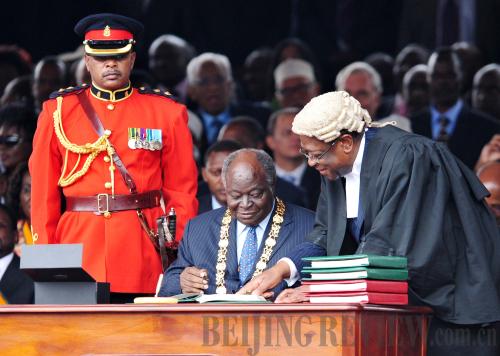|
 |
|
AROUND AFRICA: Kenyan President Kibaki signs new constitution into law (LIU CHAN) |
> Electoral wave
In 2010, there were a series of elections and referendums across the continent. Countries such as Togo, Rwanda, Tanzania, Mauritania, Sudan, Guinea, Somaliland, Burundi, Ethiopia and Ivory Coast went to the polls in an effort to strengthen the institution of democracy in their own nations and for Africa as a whole.
Kenya and Niger held constitutional referendums while Darfur is preparing for the same in 2011.
From a general analysis of the 2010 elections, the main positive attribute is that African countries seemed to now be responding to the need to institutionalize the electoral system as the democratic means to government. The situations of Ivory Coast, Guinea, Burundi and Rwanda exhibit a marked turnaround of these countries from the past evasions of elections to the establishment of some democratic form of government.
The relative peaceful and acceptable electoral processes in Mauritania, Somaliland, Togo, Tanzania, Ivory Coast, and Guinea also justify 2010 as a year in which some strides were made in enhancing the electoral infrastructure in Africa.
As we move into 2011, the African Union (AU) is better advised to leverage on the marginal gains of 2010 to continue to build a robust democratic electoral process across the continent. The pockets of disputed elections and undemocratically installed governments must find their way into extinction given the highlights of some of the 2010 election successes in Africa.
> Transitional challenges
Apart from electoral progress, the year was also marked by some political transition challenges in various countries across the continent. Some of the topical ones include Zimbabwe, Kenya, Niger and Madagascar. The coalition government in Zimbabwe, which had made some economy-stabilization gains in 2009, faced a greater disparity in 2010. The unfulfilled Global Political Agreement (GPA) term still lingers and as the year closes, the government is fractured. A possible election is being intimated for 2011 against a background of an upsurge in political tension and a dysfunctional reform process.
Kenya, however, scored some successes in 2010 with the adoption of a new constitution, which was supported by a 66.9 percent "yes" vote. The main campaigner for the "no" vote, William Ruto conceded defeat, thereby setting in a peaceful adoption of the new constitution. To date a Constitutional Implementation Oversight Committee headed by Abdikadir Mahammed has been appointed by Parliament. It is hoped that 2011 will provide opportunity for full implementation of constitutional provisions and therefore set in motion an election to establish a substantive government.
On October 31, Niger went to a Constitutional referendum following the coup d'état, which ousted Tandja Mamadou. The constitutional provisions have been instituted to provide for immunity for coup d'état leaders and that power must be handed over to a civilian government by April 6 of 2011.
The perilous Darfur conflict is also set to be fully resolved with efforts undertaken in 2010 to discharge the Darfur Amalgamation Referendum, which is pending. This referendum will sound out the possibility of merging Western, Northern and Southern Darfur into a single autonomous region having its own constitution and independence from the government of Sudan. It is hoped that the efforts and foundations laid in 2010 will yield fruit in 2011.
The illusive peace agreement in Madagascar continues to be problematic. The contention between Andry Rajoelina and Marc Ravalomanana has even defiled the efforts made by South Africa and Joaquim Chissano in the earlier parts of 2010.
Of the various transitional matters highlighted, the Zimbabwean and Madagascar situations still seem to be the most outstanding and threatening the continent's move toward electoral stability. In 2010, Ivory Coast and Guinea went to a second round of polls. Of the elections held in the year, an average of about 62 percent votes were taken by the eventual winners, this is a marked reduction from the perennial landslide electoral victories that Africa has realized in the past.
What we see is that Africa is moving away from one-party or one-man political domination to a somehow political variation in terms of contestations. This will likely therefore result in lesser and lesser margins between winners and losers. If the AU and other regional blocs such as SADC (Southern African Development Community) and ECOWAS (Economic Community of West African States) do not intensify efforts in building credible and democratic electoral processes and mechanisms, then there will be more disputed elections which may lead to the now infamous negotiated governments phenomena.
The trend of 2010 transitions must therefore indicate toward the need for African countries to establish homegrown and full-bodied constitutions and constitutionalism, while infusing a democratic electoral culture. This will inevitably satisfy the detected trend of more closely contested polls in the future.
|